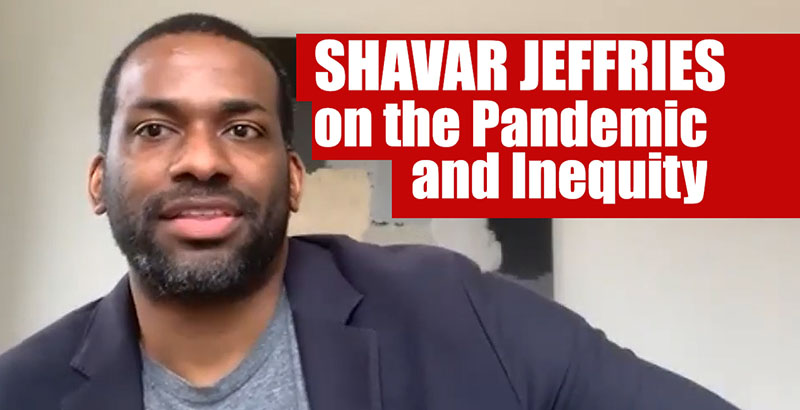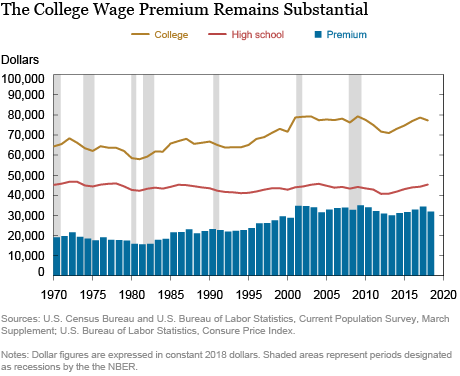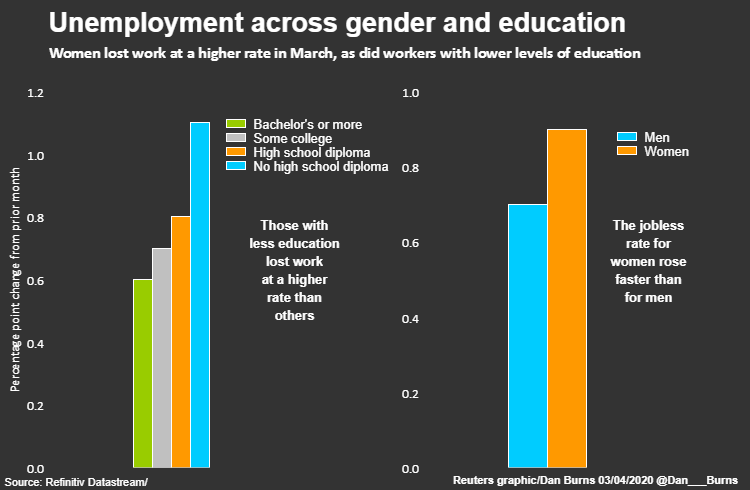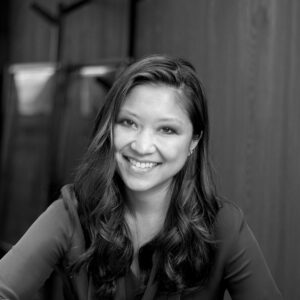74 Interview: Democrats for Education Reform’s Shavar Jeffries Pushes Feds: Coronavirus a ‘Historic Opportunity’ to Lead National Effort to Rethink Education

Shavar Jeffries is the president of Democrats for Education Reform, a former Newark, New Jersey, school board president, an ex-assistant attorney general for New Jersey and a parent. An influential education advocate, Jeffries is a key voice in the intra-Democratic debate about schools. While he is experiencing the impacts of the coronavirus pandemic like the rest of us, he is also watching it from a very unique perspective in Newark, the American city with the fifth-highest child poverty rate.
That’s why we wanted to talk with Jeffries about the educational response to the coronavirus, what he hopes to see from Joe Biden on education, the opportunity that the current crisis offers for educational equity and what the “Jeffries School” looks like for his children learning at home amid coronavirus shutdowns. We sat down with him last week via videoconference to talk about all that and more. A few of the highlights:
Jeffries speaks tough truths about why “a crisis is a terrible thing to waste,” dives deep into his past for why he is a die-hard champion for all students to work toward a college degree, lays out an education agenda for Biden, and has a thing or two to say about the Trump administration’s leadership amid the crisis.
Here’s Jeffries in his own words. The interview has been lightly edited for clarity.
It’s a remarkable time, you see this as an organization leader, as a former public official and as a parent. What are you seeing that excites and worries you?
On the positives, I’m seeing a lot of great, grassroots-level efforts of teachers, principals, school systems and administrators to work very hard to meet the tangible deficits in terms of the capacity of parents and obviously their students to access learning. I’ve seen schools rallying to raise dollars for Chromebooks to get them to low-income families that may not have them, to rally to raise dollars for hotspots so that young people can access the internet from home and access distance learning. We’ve seen efforts around meals. Just the love that communities and educators have for children, that’s been heartening. It’s been positive to see the government invest $13.5 billion in K-12, another $14 billion in higher ed.
What’s more concerning, though, is that in many ways, the coronavirus and the educational challenges associated with it have just further uncovered the things many of us already know about the inequities in terms of the ability of discrete subgroups of students to access learning. We know that children from those categories are more likely to be in homes that don’t have access to the internet, are more likely to have parents whose jobs are either more likely to be displaced, given the unemployment dislocations associated with the virus, or are in the types of jobs where they actually have to show up, which means that the student is at home, oftentimes by him or herself trying to access learning, which we know is suboptimal for students. It means that those parents are at a greater risk of exposing themselves to the virus, given that they have to go and get to a job.
Do you worry that in the educational sector, there’s too much focus on digital and online and not enough focus on the families who can’t access that either because of devices, online access or both?
I am worried about that. Part of the challenge is because public education in the United States is so disaggregated. States, counties and, of course, school districts are all over the map in terms of how they respond. We even see in some districts that individual teachers are doing things differently. Some teachers like to have live instruction where the student shows up at a certain time, and the teacher is live, providing instruction. We’re seeing some others that are recording lessons, and the parent then has to hold the student accountable to actually access those recorded lessons. We’re seeing some districts still continue to use paper, and then having some intervals over time where the teacher will check in. I think that’s less optimal for any student, but particularly, low-income students.
You’re also a civil rights attorney. Can you talk about how you see this with respect to civil rights?
It’s a huge civil rights issue. There’s a big class component, but there’s clearly racially disparate effects on all of these different domains that impact the ability of students to learn in this environment. So we’re in a distance learning space now where, obviously, kids just aren’t legally permitted to go to school in so many states right now. There’s dramatic variance in terms of what that looks like for different populations of students, across race, class, immigration and disability status as well. All four of those categories have different laws that pertain to them that can be vindicated to bring about more equity for those communities.
We have so many low-income students and students of color who simply don’t have internet access at home. We have some that do, but oftentimes, have single parents who may be out of the home at work. So what that looks like in terms of whether those students are learning or not is going to be dramatically different. We have parents who are losing their jobs in the midst of this, so their capacity even to focus on helping their students learn when they’re trying to keep the lights on and food on the table is going to be dramatically impacted also.
We have trauma because people of color are disproportionately losing their lives to the virus. We have so many students for whom either parents or other loved ones are being affected, so that’s going to bring about trauma for them as well. I do think many policymakers are aware of this. We’re simply not seeing enough effective action, and I think part of the problem is many just don’t know what to do. We have too many districts and even states figuring these things out on their own.
Obviously, there should be some discretion of flexibility because context is different, so I’m not suggesting there should be a straitjacket, one-size-fits-all [mandate]. But there should be, coming from the federal government and our states, “This is the general playbook that districts need to use to make sure that students learn broadly and that we’re addressing the needs that these discrete educational subgroups already facing educational deficits are facing even more now.”
I just think there’s too much disaggregation. I hear a lot of metaphors in this space from some of our policymakers that this is a war, and we need a government mobilization that reflects the fact that we’re in a war. But on the educational side, it’s still too much every-district-for-themselves. That’s only going to exacerbate these inequities.
What’s the impact of the coronavirus going to be on education politics?
The Rahm Emanuel slogan of “a crisis is a terrible thing to waste.” I’m hopeful that those of us who are advocates can work with policymakers to really push. I’m hopeful that we can do some big things. How do we support teachers better? How do we prepare teachers better? How do we have a continuous, seamless learning environment from school to home? If we can do it right and leverage technology, where we can actually create a space where we can reduce the variance in terms of the quality of education that individual students receive. That’s what I’m hopeful will happen.
(Editor’s note: Emanuel’s exact statement was, “You never want a serious crisis to go to waste,” which was perhaps a subconscious variation on “A crisis is a terrible thing to waste,” a phrase coined by Stanford economist Paul Romer, who — somewhat ironically — said it was a riff on the United Negro College Fund’s slogan, “A mind is a terrible thing to waste.”)
I’m fearful what will happen is that the traditional interest groups that tend to hold disproportionate sway about educational policy outcomes will do the things that they generally do, which is advocate primarily for the personnel side, to save jobs, to pay personnel better. We need to do those things, absolutely. We need those things plus many other things. I’m fearful we’ll just simply stop at the personnel and the adult-related inputs versus really reimagining what education should look like for the next 100 years in this country.
I am also worried that those same forces that would love the feds just to write a check and get out of the way, and not hold states and districts accountable for results, will view this as an opportunity to use the one-year temporary pause in accountability to create a bigger wedge in that. The entire reason we make investments in public education is we want our young people to have certain sets of competencies, to have certain skills, and we have to hold the system accountable for that. It has to be fair. It can’t be overbearing. None of us want to have such a proliferation of assessments that it gets in the way of effective teaching and learning, but nor can we go the other way and simply allow our students to essentially go into a black box where we just hope that they’re learning and we don’t know until they hit the workforce. Then we found out many years later that they weren’t.
On the workforce front, unemployment rates are always higher for people with less than a college degree. The concept of whether we should emphasize college is controversial. How do you look at higher education?
I think it’s critical. I think it’s the threshold that we should push all students for, even recognizing that all may not surpass that threshold. So you should have some secondary option available, but I think the primary push ought to be for college.
The reality is, recent data show that a college graduate makes, on average, $30,000 more per year than someone who doesn’t have a college degree. You aggregate that over the course of a 40-year career, you’re talking about $1.2 million in additional income.

That’s just one indicator. The range of options available to a person in the labor market [also increases with a degree] — college graduates have an easier ability to access capital, all types of data on that in terms of ability to get small business loans, to get private equity investments. Across the board, a college degree, while there is no 100 percent guarantee that any intervention will lead to a certain result, dramatically increases the probability that a person will be able to live a choice-filled life, particularly for low-income people and particularly for people of color.
We see it now. Those people who are most able to keep a job, most able to work from home, tend to be those with college degrees. Those who are most likely to be displaced and lose their job or be laid off or furloughed [tend to be those without college degrees]. Even if they have a job, they’re put in a dangerous situation where they have to show up in an environment where they’re exposed to others, which could increase a likelihood that they get the virus. This is part of the reason we see so many poor people and people of color, in particular, dying from this virus.

Your stance on college is certainly colored by your own experience. Tell us a little bit about your upbringing and your educational trajectory.
I’m speaking to you now from downtown Newark, where I live. I grew up in the South Ward of Newark, which was a segregated, poor, African-American community a handful of miles from where I live now. I grew up in an amazing community of brilliant people. Just everyday, commonsense geniuses. But in our community, we didn’t know what college was. We didn’t have people really going to college. College, I would also oftentimes say, is like Mars. It’s something we heard about, but we never knew anyone that went there.
When I was 12, a philanthropist named Ray Chambers, who’s a hero of mine, created a scholarship for about 20 kids in Newark to go to college-prep high schools. So I was at the Boys and Girls Club playing basketball. One of the counselors came to me and said, “Hey, we have this opportunity. I think it’d be great for you.” I filled out the paper she gave me, and next thing I know, I received a scholarship to go to an all-boys Catholic high school in West Orange, New Jersey, called Seton Hall Prep. I did not want to go to that all-boys Catholic high school because you had to wear tan khaki pants, and we had to go to mass — I had never been to a church service without percussion — and I had to take the public bus for an hour and a half. That wasn’t fun, but it really changed my life because everything was focused on college.
The rigor academically was very strong, and as a result, I’d be the first in my family to go away to college. I went to Duke University. I had other scholarships that enabled me to do that because my family couldn’t afford [Duke]. I went to law school from there, but it all started with that opportunity to get a college-prep high school education, which set me up on my way.
I came back to Newark, and I saw the people I grew up with, the people that were in my community who compared to me were smarter, tougher, more talented. They just didn’t get somebody at the Boys and Girls Club to tap them on the shoulder and give them a piece of paper that connected with them the type of opportunity that I was given. So I’m very passionate because I just live a whole different life. Now, I’m still in my community. I was very proud to found the KIPP Schools here in Newark to make sure other kids can have the opportunities I’ve had. I’ve done civil rights litigation for 20 years here to give back, but at the same time, I’m living a very different life than anyone else in my family did before me. My children live in a very different life, and it’s all connected to that college degree.
I push everybody on it, even in our community. When I was the president of the school board, I had some of our parents and families saying, “I don’t think everybody needs to go to college.” I was like, “You know what? Respectfully, that means we go to help you see what the possibilities are that are associated with this opportunity.” That doesn’t mean everyone’s going to be able to excel in this way. That doesn’t mean you may not graduate, have a bunch of debt and have difficulties getting a job. Absolutely, there’s risk, but the risk in relation to reward is significantly better for this pathway as compared to others. It clearly changed my life, which clearly informs why I’m so passionate about it, and I think it can do the same for others, too.
You’re a parent. How are you responding and supplementing this? What does Jeffries’s school look like?
My daughter is an eighth-grader at KIPP here in Newark. (Editor’s note: Jeffries serves on the KIPP Foundation Board of Directors.) My son is a freshman at Science Park High School, which is one of our magnet schools here in Newark. Both systems have worked hard to try to make distance learning available to students. My eighth-grader has some live classes. She has some recorded classes as well. The school, every day, sends a lesson plan for what she should be doing, and what we as parents can do to help her. The district doesn’t necessarily do the daily communication, but they provide a broader map that we can use to hold our son accountable for doing what he needs to do.
We’re doing the best we can, but it’s definitely suboptimal. And we are blessed compared to many. We have two parents at home. We’re both college-educated. We’re trying to work during the day. We’re trying to make sure our children are learning what they’re supposed to learn. This isn’t a school environment where everything is set up to make sure the students are learning. Like I said, we’re better able to mitigate some of those gaps than others, but it’s a challenge.
What do you want to see from Joe Biden on education — both in his campaign and in a possible Biden administration?
I’m hopeful we’ll see some of the things we saw with President Obama, which is what we would call “resources plus” — resources plus innovation, resources plus results. Traditionally, Democrats tend to focus primarily on money and then a variety of civil rights and equity-related inputs, which are very important — nondiscrimination, integration, treating special education students equitably, students who speak English as a second language as well. But most of the focus tends to be on, “We have to add more resources.” We absolutely have to be able to do that, but we’d really like to see Vice President Biden and his administration go further.
For example, there’s a lot of conversation in the country around paying our teachers better. We absolutely support that, but we want to marry increases in federal support to pay our teachers better with reimagining teacher preparation programs. Many of the teacher preparation programs according to the teachers themselves simply do not equip them with what they need to be effective in the classroom. There’s also the capacity to bring in new providers that have more diverse students in their pipeline so that we can diversify the teaching force and equip them with more clinical input so that they can actually drive achievement in the classroom. So we’d like to add to the increased investment in dollars some reimagination in terms of how we prepare our teachers.
There’s a lot of conversation around affordability and free college. Affordability is critical. We also have to push college to actually admit on an equitable basis highly qualified low-income students and students of color. There are too many schools that’ll actually admit lower-qualified middle- and upper-income students as opposed to better-qualified low-income students. We also have colleges that are basically dropout factories. We have to say, “In exchange for increased investments, we have to hold schools accountable for better outcomes.”
We believe that student choices and parent choice is a critical part because it creates a space for differentiation and innovation versus the more traditional model where you look at people’s addresses and just assign the schools on that basis. So we’re also hopeful this can be a space for broader choice, broader options within the public education system.
We’d love to see [the hypothetical] President Biden double down on investments. That ought to be a space that Democrats and hopefully many Republicans can agree on. We also, on a bipartisan basis, can get some agreement around new ideas, a focus on results, bringing innovation to the space — particularly in the aftermath of the coronavirus, where it’s just exposed these deep inequities that I also believe can create a space for some new political alliances, because rural, white communities are being devastated by this. They actually tend to have less access to the infrastructure with respect to distance learning. So as a party, while we have to keep track of the racial differences because that just exacerbates these issues, I think there’s an opportunity to also align around class to create a different type of coalition that can hopefully create some real change.
Do you see the coronavirus crisis more as a handicap to or as an opportunity for educational equity?
I think it’s an opportunity. Whether or not it becomes more of an opportunity or a handicap will depend upon what we as a country do, if we as a country rise to the occasion. There are going to be extraordinary investments in education in the months ahead. I’m very confident about that.
If we make those investments as a country in a way that simply is kind of path-deterministic, we just keep doing the things that we’ve generally done, but maybe around the edges build some dollars for remote learning — if we do that, it’ll be back to the states figuring it all out. Most of those states will use those dollars to do the things they’ve traditionally done or the things that the bureaucracy’s been captured to do — to take care of the adults and the personnel. Sometimes it’s zero-sum. We love the adults and personnel, but we love the kids even more, to be honest with you.
So I fear if we just do that, the locals will do the things that they’re used to doing, which are filling budget deficits, taking care of adults, not doing anything that’s really transformational in terms of educational policy broadly, let alone equity.
I think the national government has to be a leader on this. Sadly, I’m very skeptical that will come from the Trump administration. I would hope it might come from the Biden administration, but I’d be concerned about whether they’re going to have the orientation to say, “Look, this is a historic opportunity to deal with the fact that we have to really think through what education should look like now.” If we have 10, 15, 20 million students over the next year who are going to be learning from home, we have to really think differently about how we serve them in a way that not only meets the short-term challenges, but the long-term.
Then I think it’d be a tremendous opportunity, but the jury is out in terms of which direction the country will take.
Get stories like these delivered straight to your inbox. Sign up for The 74 Newsletter

;)

